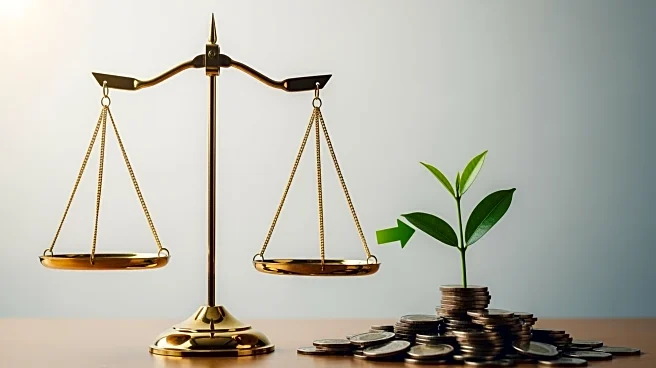What's Happening?
The European Union Commission has announced measures to stabilize carbon pricing for road and heating fuels under the ETS2 scheme. This initiative aims to prevent price spikes and facilitate revenue redistribution
to support low and middle-income families in transitioning away from fossil fuels. The Commission plans to implement a frontloading mechanism, allowing member states to auction ETS2 allowances as early as 2026, generating revenues before the scheme's official launch in 2027. These funds can be used to make greener alternatives, such as public transport and electric vehicle leasing, more affordable. Additionally, the Commission has set a price cap, ensuring that if the cost of a ton of CO2 exceeds €45, additional allowances will be released to maintain price stability.
Why It's Important?
The stabilization of carbon pricing is crucial for ensuring that the transition to cleaner technologies does not disproportionately affect low and middle-income households. By providing financial support through the redistribution of ETS2 revenues, governments can mitigate the economic impact on these families and small to medium-sized enterprises (SMEs). This approach not only promotes environmental sustainability but also addresses social equity concerns, making the transition to a low-carbon economy more inclusive. The initiative is expected to encourage investment in clean transport and building infrastructure, contributing to broader climate goals.
What's Next?
The formal proposal from the EU Commission is expected to be unveiled in the coming weeks, detailing the specifics of the frontloading mechanism and the auctioning process for ETS2 allowances. Member states will need to prepare for the implementation of these measures, including the development of complementary actions to support affected households and businesses. The success of this initiative will depend on the cooperation and proactive measures taken by individual governments to ensure the effective use of redistributed revenues.
Beyond the Headlines
The ETS2 reform highlights the EU's commitment to balancing environmental objectives with economic and social considerations. By addressing potential price volatility and ensuring revenue redistribution, the Commission is taking steps to prevent economic disparities that could arise from the transition to a low-carbon economy. This approach may serve as a model for other regions seeking to implement similar carbon pricing mechanisms while maintaining social equity.









